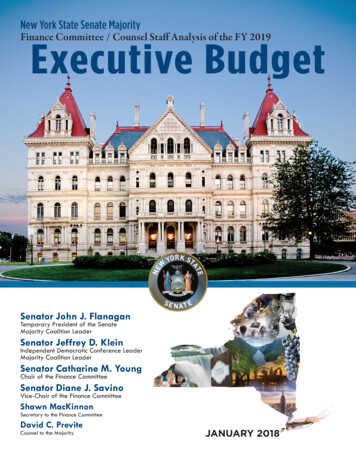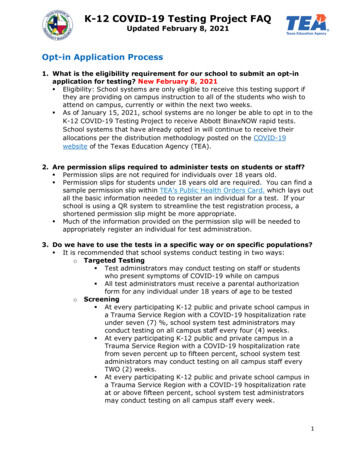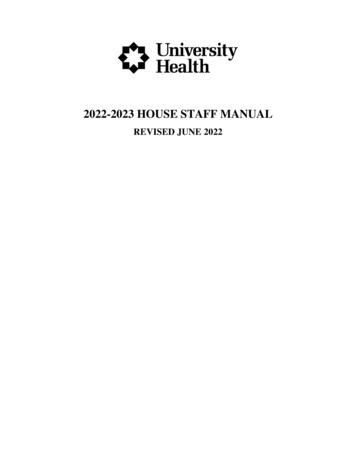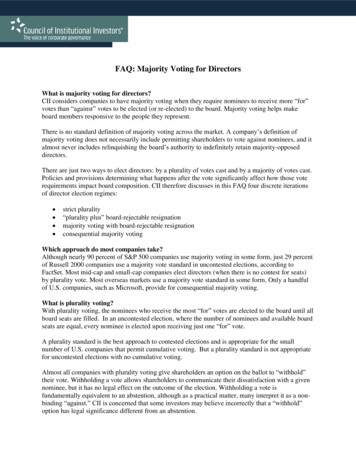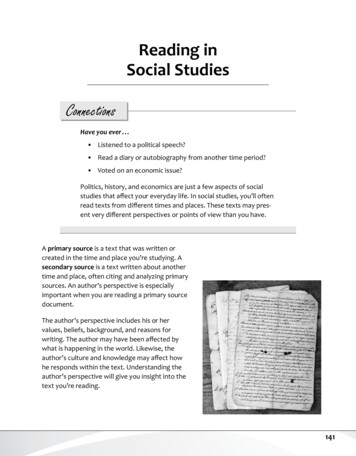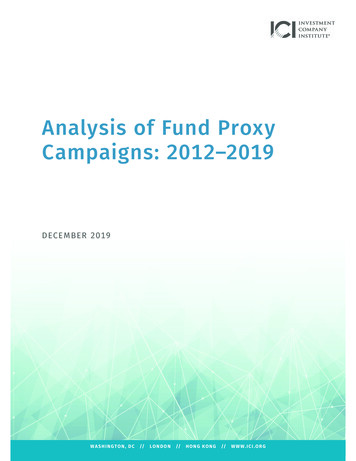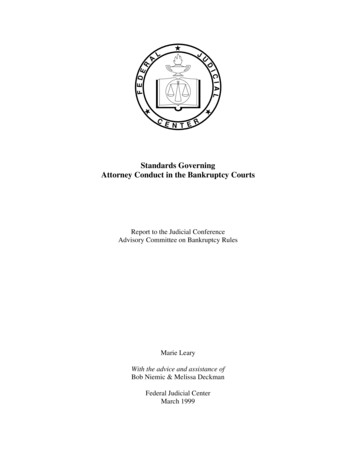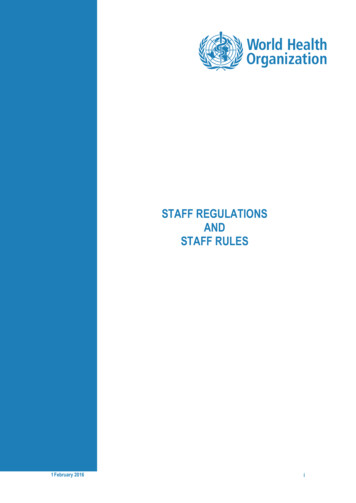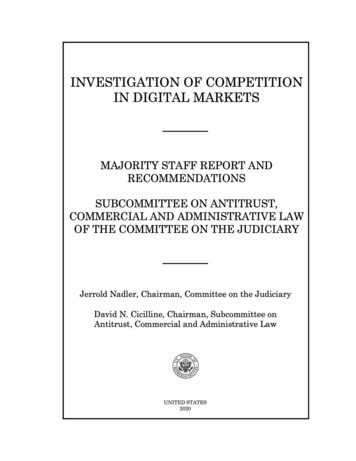
Transcription
MAJORITY STAFFSUBCOMMITTEE ON ANTITRUST, COMMERCIAL AND ADMINISTRATIVE LAWSLADE BONDChief CounselLINA KHANCounselPHILLIP BERENBROICKCounselJOSEPH EHRENKRANTZSpecial AssistantAMANDA LEWISCounsel on Detail, Federal Trade CommissionANNA LENHARTTechnologistCATHERINE LARSENSpecial AssistantJOSEPH VAN WYEProfessional Staff MemberCOMMITTEE ON THE JUDICIARYPERRY APELBAUMStaff Director and Chief CounselAARON HILLERDeputy Chief CounselSHADAWN REDDICK-SMITHCommunications DirectorJESSICA PRESLEYDirector of Digital StrategyMADELINE STRASSERChief ClerkAMY RUTKINChief of StaffJOHN WILLIAMSParliamentarianDANIEL SCHWARZDirector of Strategic CommunicationsMOH SHARMADirector of Member Services andOutreach & Policy AdvisorNATHAN ADALLegal FellowKARNA ADAMLegal FellowWILLIAM BEKKERLegal FellowKYLE BIGLEYLegal FellowMICHAEL ENSEKI-FRANKLegal FellowBENJAMIN FEISLegal FellowCORY GORDONLegal FellowETHAN GURWITZLegal FellowDOMENIC POWELLLegal FellowJOHN DOTYSenior AdvisorDAVID GREENGRASSSenior CounselARYA HARIHARANDeputy Chief Oversight CounselMATTHEW ROBINSONCounselKAYLA HAMEDIDeputy Press SecretaryARMAN RAMNATHLegal FellowREED SHOWALTERLegal FellowJÖEL THOMPSONLegal FellowKURT WALTERSLegal FellowKRYSTALYN WEAVERLegal Fellow
TABLE OF CONTENTSA.Chairs’ Foreword . 6B.Executive Summary . 9Subcommittee’s Investigation . 9Findings . 10Recommendations . 19A.Requests for Information and Submissions . 21First-Party Requests for Information . 21Process for Obtaining Responses to First-Party Requests. 25Third-party Requests for Information . 26Antitrust Agencies Requests for Information . 28B.Hearings . 29C.Roundtables . 31D.Prior Investigations . 32A.Overview of Competition in Digital Markets . 36The Role of Competition Online . 36Market Structure . 37Barriers to Entry . 40B.Effects of Platform Market Power . 46Innovation and Entrepreneurship . 46Privacy and Data Protection . 51The Free and Diverse Press . 57Political and Economic Liberty . 73A.Online Search . 77B.Online Commerce . 84C.Social Networks and Social Media . 88Social Networks are Distinguishable from Social Media . 90Market Concentration . 92D.Mobile App Stores . 93E.Mobile Operating Systems . 1003
F.Digital Mapping . 107G.Cloud Computing . 109H.Voice Assistant . 120I.Web Browsers . 126J.Digital Advertising . 129A.Facebook . 132Overview . 132Social Networking . 133Digital Advertising . 170B.Google . 174Overview . 174Search . 176Digital Advertisements . 206Android and Google Play Store. 211Chrome . 223Maps . 230Cloud . 245C.Amazon . 247Overview . 247Amazon.com. 254Fulfillment and Delivery . 302Alexa’s Internet of Things Ecosystem . 305Amazon Web Services . 316D.Apple . 330Overview . 330iOS and the App Store . 334Siri Intelligent Voice Assistant. 373A.Restoring Competition in the Digital Economy . 377Reduce Conflicts of Interest Thorough Structural Separations and Line of BusinessRestrictions . 378Implement Rules to Prevent Discrimination, Favoritism, and Self-Preferencing . 382Promote Innovation Through Interoperability and Open Access . 384Reduce Market Power Through Merger Presumptions . 3874
Create an Even Playing Field for the Free and Diverse Press . 388Prohibit Abuse of Superior Bargaining Power and Require Due Process . 389B.Strengthening the Antitrust Laws . 391Restore the Antimonopoly Goals of the Antitrust Laws . 391Invigorate Merger Enforcement . 392Rehabilitate Monopolization Law . 395Additional Measures to Strengthen the Antitrust Laws . 398C.Strengthening Antitrust Enforcement . 399Congressional Oversight . 399Agency Enforcement . 401Private Enforcement . 403A.Amazon . 406B.Apple . 414C.Facebook . 423D.Google . 4315
INTRODUCTIONA.Chairs’ ForewordIn June 2019, the Committee on the Judiciary initiated a bipartisan investigation into the stateof competition online, spearheaded by the Subcommittee on Antitrust, Commercial and AdministrativeLaw. As part of a top-to-bottom review of the market, the Subcommittee examined the dominance ofAmazon, Apple, Facebook, and Google, and their business practices to determine how their poweraffects our economy and our democracy. Additionally, the Subcommittee performed a review ofexisting antitrust laws, competition policies, and current enforcement levels to assess whether they areadequate to address market power and anticompetitive conduct in digital markets.Over the course of our investigation, we collected extensive evidence from these companies aswell as from third parties—totaling nearly 1.3 million documents. We held seven hearings to reviewthe effects of market power online—including on the free and diverse press, innovation, and privacy—and a final hearing to examine potential solutions to concerns identified during the investigation and toinform this Report’s recommendations.A year after initiating the investigation, we received testimony from the Chief ExecutiveOfficers of the investigated companies: Jeff Bezos, Tim Cook, Mark Zuckerberg, and Sundar Pichai.For nearly six hours, we pressed for answers about their business practices, including about evidenceconcerning the extent to which they have exploited, entrenched, and expanded their power over digitalmarkets in anticompetitive and abusive ways. Their answers were often evasive and non-responsive,raising fresh questions about whether they believe they are beyond the reach of democratic oversight.Although these four corporations differ in important ways, studying their business practices hasrevealed common problems. First, each platform now serves as a gatekeeper over a key channel ofdistribution. By controlling access to markets, these giants can pick winners and losers throughout oureconomy. They not only wield tremendous power, but they also abuse it by charging exorbitant fees,imposing oppressive contract terms, and extracting valuable data from the people and businesses thatrely on them. Second, each platform uses its gatekeeper position to maintain its market power. Bycontrolling the infrastructure of the digital age, they have surveilled other businesses to identifypotential rivals, and have ultimately bought out, copied, or cut off their competitive threats. And,finally, these firms have abused their role as intermediaries to further entrench and expand theirdominance. Whether through self-preferencing, predatory pricing, or exclusionary conduct, thedominant platforms have exploited their power in order to become even more dominant.To put it simply, companies that once were scrappy, underdog startups that challenged thestatus quo have become the kinds of monopolies we last saw in the era of oil barons and railroadtycoons. Although these firms have delivered clear benefits to society, the dominance of Amazon,Apple, Facebook, and Google has come at a price. These firms typically run the marketplace while6
also competing in it—a position that enables them to write one set of rules for others, while they playby another, or to engage in a form of their own private quasi regulation that is unaccountable to anyonebut themselves.The effects of this significant and durable market power are costly. The Subcommittee’s seriesof hearings produced significant evidence that these firms wield their dominance in ways that erodeentrepreneurship, degrade Americans’ privacy online, and undermine the vibrancy of the free anddiverse press. The result is less innovation, fewer choices for consumers, and a weakened democracy.Nearly a century ago, Supreme Court Justice Louis Brandeis wrote: “We must make ourchoice. We may have democracy, or we may have wealth concentrated in the hands of a few, but wecannot have both.” Those words speak to us with great urgency today.Although we do not expect that all of our Members will agree on every finding andrecommendation identified in this Report, we firmly believe that the totality of the evidence producedduring this investigation demonstrates the pressing need for legislative action and reform. These firmshave too much power, and that power must be reined in and subject to appropriate oversight andenforcement. Our economy and democracy are at stake.As a charter of economic liberty, the antitrust laws are the backbone of open and fair markets.When confronted by powerful monopolies over the past century—be it the railroad tycoons and oilbarons or Ma Bell and Microsoft—Congress has acted to ensure that no dominant firm captures andholds undue control over our economy or our democracy. We face similar challenges today.Congress—not the courts, agencies, or private companies—enacted the antitrust laws, and Congressmust lead the path forward to modernize them for the economy of today, as well as tomorrow. Ourlaws must be updated to ensure that our economy remains vibrant and open in the digital age.Congress must also ensure that the antitrust agencies aggressively and fairly enforce the law.Over the course of the investigation, the Subcommittee uncovered evidence that the antitrust agenciesfailed, at key occasions, to stop monopolists from rolling up their competitors and failed to protect theAmerican people from abuses of monopoly power. Forceful agency action is critical.Lastly, Congress must revive its tradition of robust oversight over the antitrust laws andincreased market concentration in our economy. In prior Congresses, the Subcommittee routinelyexamined these concerns in accordance with its constitutional mandate to conduct oversight andperform its legislative duties. As a 1950 report from the then-named Subcommittee on the Study ofMonopoly Power described its mandate: “It is the province of this subcommittee to investigate factorswhich tend to eliminate competition, strengthen monopolies, injure small business, or promote undue7
concentration of economic power; to ascertain the facts, and to make recommendations based on thosefindings.”1Similarly, the Subcommittee has followed the facts before it to produce this Report, which isthe product of a considerable evidentiary and oversight record. This record includes: 1,287,997documents and communications; testimony from 38 witnesses; a hearing record that spans more than1,800 pages; 38 submissions from 60 antitrust experts from across the political spectrum; andinterviews with more than 240 market participants, former employees of the investigated platforms,and other individuals totaling thousands of hours. The Subcommittee has also held hearings androundtables with industry and government witnesses, consultations with subject-matter experts, and acareful—and at times painstaking—review of large volumes of evidence provided by industryparticipants and regulators.In light of these efforts, we extend our deep gratitude to the staff of the Subcommittee and FullCommittee for their diligent work in this regard, particularly during the COVID-19 pandemic andother challenging circumstances over the past year.Finally, as an institutional matter, we close by noting that the Committee’s requests forinformation from agencies and any non-public briefings were solely for the purpose of carrying out ourconstitutionally based legislative and oversight functions. In particular, the information requested wasvital to informing our assessment of whether existing antitrust laws are adequate for tackling currentcompetition problems, as well as in uncovering potential reasons for under-enforcement. The Reportby Subcommittee staff is based on the documents and information collected during its investigation,and the Committee fully respects the separate and independent decisional processes employed byenforcement authorities with respect to such matters.Although the companies provided substantial information and numerous documents to theSubcommittee, they declined to produce certain critical information and crucial documents werequested. The material withheld was identified by the Committee as relevant to the investigation andincluded, primarily, two categories of information: (1) documents the companies’ claimed wereprotected by common law privileges; and (2) documents that were produced to antitrust authorities inongoing investigations, or that related to the subject matter of these ongoing investigations.Institutionally, we reject any argument that the mere existence of ongoing litigation prevents orprohibits Congress from obtaining information relevant to its legislative and oversight prerogatives.We strongly disagree with the assertion that any requests for such materials and any compliance withthose requests interfere with the decisional processes in ongoing investigations. Furthermore, whileCongress is fully subject to constitutional protections, we cannot agree that we are bound by common1H. REP. NO. 255, at 2 (1951) (Aluminum: Report of the Subcomm. On Study of Monopoly Power of the H. Comm. on theJudiciary).8
law privileges as asserted by the companies. While we determined that insufficient time exists topursue these additional materials during this Congress, the Committee expressly reserves the right toinvoke other available options, including compulsory process, to obtain the requested information inthe future.The views and conclusions contained in the Report are staff views and do not necessarilyreflect those of the Committee on the Judiciary or any of its Members.B.Executive SummarySubcommittee’s InvestigationOn June 3, 2019, the House Judiciary Committee announced a bipartisan investigation intocompetition in digital markets,2 led by the Subcommittee on Antitrust, Commercial and AdministrativeLaw.3 The purpose of the investigation was to: (1) document competition problems in digital markets;(2) examine whether dominant firms are engaging in anticompetitive conduct; and (3) assess whetherexisting antitrust laws, competition policies, and current enforcement levels are adequate to addressthese issues.4 The Committee initiated the investigation in response to broad-ranging investigativereporting, and activity by policymakers and enforcers, that raised serious concerns about the platforms’incentives and ability to harm the competitive process.52Press Release, H. Comm. on the Judiciary, House Judiciary Committee Launches Bipartisan Investigation intoCompetition in Digital Markets (June 3, 2019), gation-competition-digital.3We extend our sincere thanks to Peter Karafotas, Rich Luchette, and Francis Grubar, in the Office of Congressman DavidN. Cicilline, for their relentless work and selfless devotion throughout the investigation. We would also like to recognizethe following staff for their significant contributions during the investigation: Dick Meltzer, Michael Tecklenburg, KennethDeGraff, and Victoria Houed in the Office of the Speaker of the U.S. House of Representatives; Daniel Flores, formerMinority Chief Counsel, Subcommittee on Antitrust, Commercial and Administrative Law; Danny Johnson, formerMinority counsel, Committee on the Judiciary; Jacqui Kappler, Legislative Director, the Honorable Henry “Hank” Johnson,Jr.; Devon Ombres, Legislative Counsel, the Honorable Jamie Raskin; Elly Kugler, Senior Counsel, the Honorable PramilaJayapal; Jennifer Chan, Legislative Director, the Honorable Pramila Jayapal; Stuart Styron, Senior Legislative Assistant,the Honorable Val Demings; Keanu Rivera, Legislative Assistant, the Honorable Mary Gay Scanlon; Lindsey Garber,Legislative Counsel, the Honorable Joe Neguse; Miya Patel, former Legislative Assistant, the Honorable Joe Neguse; andNatalie Knight, Legislative Counsel, the Honorable Lucy McBath. Staff would also like to thank Matthew Bisenius in theOffice of F. James Sensenbrenner, as well as Garrett Ventry in the Office of Congressman Ken Buck, for their commitmentto bipartisan cooperation. We also thank Hillary Marston, Legal Intern for the Committee on the Judiciary, for herassistance. Finally, we thank Clare Cho and Mari Lee at the Congressional Research Service for their support, as well asgraphics and data visualization used within this Report.4Press Release, H. Comm. on the Judiciary, House Judiciary Committee Launches Bipartisan Investigation intoCompetition in Digital Markets (June 3, 2019), gation-competition-digital.5See, e.g., Meehreen Khan, EU Targets Tech Giants over Unfair Business Practices, FIN. TIMES (Apr. 25, 8-8ee8-cae73aab7ccb; Adam Satariano, Google is Fined 57 Million UnderEurope’s Data Privacy Law, N.Y. TIMES (Jan. 21, 2019), le-europegdpr-fine.html; Richard Waters et al., Global Regulators’ Net Tightens Around Big Tech, FIN. TIMES, (June 5, 9-97ea-05ac2431f453.9
As part of the investigation, the Subcommittee held seven oversight hearings that providedMembers of the Subcommittee with an opportunity to examine the state of competition in digitalmarkets and the adequacy of existing antitrust laws. A diverse group of witnesses offered testimony ontopics related to the effects of market power on the free and diverse press, on innovation, and onprivacy. Other witnesses who testified included executives from businesses with concerns about thedominance of the investigated firms. The hearings also provided an opportunity for key executivesfrom Facebook, Google, Amazon, and Apple—including the Chief Executive Officers of these firms—to address evidence that was uncovered during the investigation in a public-facing venue. After each ofthe hearings, Members of the Subcommittee submitted questions for the record (QFRs) to thewitnesses.The Committee requested information from the dominant platforms, from market participants,from the Federal antitrust agencies, and from other relevant parties, for the purpose of obtaininginformation that was not otherwise publicly available but was important to assembling acomprehensive record. The Committee also sent requests for submissions to various experts in thefield, including academics, representatives of public interest groups, and practicing antitrust lawyers.The responses to these requests were indispensable to staff’s ability to complete this Report and itsrecommendations for congressional oversight of the antitrust agencies and legislative action.This Report is intended to provide policymakers, antitrust enforcers, market participants, andthe public with a comprehensive understanding of the state of competition in the online marketplace.The Report also provides recommendations for areas of legislative activity to address the rise andabuse of market power in the digital economy, as well as areas that warrant additional congressionalattention.Findingsa. OverviewThe open internet has delivered significant benefits to Americans and the U.S. economy. Overthe past few decades, it has created a surge of economic opportunity, capital investment, and pathwaysfor education. The COVID-19 pandemic has underscored the importance of internet access that isaffordable, competitive, and widely available for workers, families, and businesses.The online platforms investigated by the Subcommittee—Amazon, Apple, Facebook, andGoogle—also play an important role in our economy and society as the underlying infrastructure forthe exchange of communications, information, and goods and services. As of September 2020, thecombined valuation of these platforms is more than 5 trillion—more than a third of the value of theS&P 100. As we continue to shift our work, commerce, and communications online, these firms standto become even more interwoven into the fabric of our economy and our lives.10
Over the past decade, the digital economy has become highly concentrated and prone tomonopolization. Several markets investigated by the Subcommittee—such as social networking,general online search, and online advertising—are dominated by just one or two firms. The companiesinvestigated by the Subcommittee—Amazon, Apple, Facebook, and Google—have captured controlover key channels of distribution and have come to function as gatekeepers. Just a decade into thefuture, 30% of the world’s gross economic output may lie with these firms, and just a handful ofothers.6In interviews with Subcommittee staff, numerous businesses described how dominantplatforms exploit their gatekeeper power to dictate terms and extract concessions that no one wouldreasonably consent to in a competitive market. Market participants that spoke with Subcommittee staffindicated that their dependence on these gatekeepers to access users and markets requires concessionsand demands that carry significant economic harm, but that are “the cost of doing business” given thelack of options.This significant and durable market power is due to several factors, including a high volume ofacquisitions by the dominant platforms. Together, the firms investigated by the Subcommittee haveacquired hundreds of companies just in the last ten years. In some cases, a dominant firm evidentlyacquired nascent or potential competitors to neutralize a competitive threat or to maintain and expandthe firm’s dominance. In other cases, a dominant firm acquired smaller companies to shut them downor discontinue underlying products entirely—transactions aptly described as “killer acquisitions.”7In the overwhelming number of cases, the antitrust agencies did not request additionalinformation and documentary material under their pre-merger review authority in the Clayton Act toexamine whether the proposed acquisition may substantially lessen competition or tend to create amonopoly if allowed to proceed as proposed. For example, of Facebook’s nearly 100 acquisitions, theFederal Trade Commission engaged in an extensive investigation of just one acquisition: Facebook’spurchase of Instagram in 2012.During the investigation, Subcommittee staff found evidence of monopolization and monopolypower. For example, the strong network effects associated with Facebook has tipped the market towardCatherine Fong et al., Prime Day and the broad reach of Amazon’s ecosystem, MCKINSEY & CO. (Aug. 2, -broad-reach-ofamazons-ecosystem (“This ecosystem strategy in particular has significant competitive implications because McK
7 also competing in it—a position that enables them to write one set of rules for others, while they play by another, or to engage in a form of their own private quasi regulation that is unaccountable to anyone but themselves.
